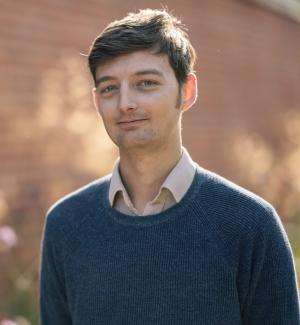The question from my social worker that changed my life

Published by Professional Social Work magazine
Matt Taylor could so easily have ended up in prison, another statistic from a childhood spent in care. But instead he finds himself studying at Oxford University and pursuing a successful music career. LOUISE PALFREYMAN finds out how, with a little help, he turned it around…
He has won awards for his recording work and collaborated with major stars. He sits on the board of the Music Producer’s Guild and has a literary agent at Curtis Brown in London. He is studying for a Masters in Creative Writing at the University of Oxford.
But success hasn’t come easily, and even now, it doesn’t always sit well with him. Rather than imposter syndrome, he talks about intruder syndrome when he’s picking up an award at a star-studded ceremony, or walking through the gates of his college in Oxford.
“I’ve worked really hard, and absolutely should be there, but it’s a world I know I’m not supposed to be in,” he says.
The path to getting there has been much longer for Matt because his experiences in care and the abruptness of leaving left their mark.
“I had all these dreams, of becoming a recording engineer and working in London, but I didn’t have the grades like the other kids, and there was no way I could move to London and just work in studios for free.
“People in the creative industries are always saying, ‘Put yourself out there and be confident,’ but I had zero confidence. Putting myself out there is difficult for me.”
Matt believes he could, and should, have gone to university at 18, but the shock of being discharged from the care system rocked his confidence and his self-belief. He has also found it hard to trust people, and trust in himself at times.
And so having people who will say ‘It’s going to be okay’ is crucial for him, as it is for thousands of other care leavers.
He says: “I grew up on the Isle of Man in the care system, living in children’s homes. I was off the rails, excluded from school, involved in crime, drugs.
“After my last incident of stealing from my mother, my brother went back to live with her but I stayed in the care home - too out of control to be in foster care.”
Music is the thing that saved him, and it was critical input from a handful of key people along the way that changed the course of Matt’s life.
“When I was 15, I started to play guitar. One day an agency staff worker who just happened to also play guitar, came into the children’s home. I’d never met a musician before.
“There was this battered old acoustic lying around, so I asked him to show me the chords to Hurt by Johnny Cash. He did, and that was all I needed.
“I’d been in and out of court from school onwards and kept being told I should break away from my friends. That’s a big thing to ask a 15-year-old, to just stop being friends with people.
“I was also having drug counselling and the drug counsellor said one of the hardest things people find when quitting drugs is breaking the old routines. But the guitar provided that - I ended up getting really obsessed with it, addicted some would say. I stayed in all day, playing and playing and playing.”
Around the same time, Matt got a new social worker, whose son was also into music. It was a question she asked one day that sparked something in him.
“She asked me ‘If you like music so much, why don’t you consider doing it as a job?’ and it just set off loads of lightning bolts.
“There was the obvious question of how somebody like me would ever achieve this. But thanks to this social worker she got me into college. She helped me apply to study music technology in Buxton, which is how I ended up in the UK.”
Matt needed somewhere to live. He was still in the care system, managed by the team back on the Isle of Man, but the social worker found him supported lodgings near college with a local woman, Fiona. And so, at the age of 16, he left everything he’d ever known to start a new life.
What happened next proved a pivotal moment, and Matt could easily have ended up in prison. He still had a drug habit and was spending a fortune on Mephedrone.
“I started to spiral again,” Matt says, “and six months after moving in with Fiona I stole money from her.
“She found out and I was charged at the police station. Social services said they would take me back to the Isle of Man, and everyone was telling Fiona she should let me go. But she said: ‘All his life he’s had adults letting him down, and I’m not going to do that to him.’”
Fiona went with Matt to court. He remembers: “She sat next to me, and the judge said ‘The fact that she can sit next to you, be with you and support you means that she has forgiven you.’ And then he said that meant the court had to forgive me, too. The judge saw no point in giving me a custodial sentence, though he had been considering sending me to prison.”
Matt was sent away with a community order, and went back to live with Fiona, who continued to support him. He completed his music course and was feeling ready to take on the world, when his social worker from the Isle of Man came to visit and told him he would be leaving the care system.
“It was a total bombshell. I thought it was just a normal check-up meeting. But the social worker said ‘You’re 19 now and you seem to be doing all right, so we think you’re ready to be discharged.’ And that was that.”
The social worker gave Matt a tenancy agreement for his lodgings, informing him they would pay the first month’s rent, then after that it would be up to him.
“Fiona just ripped it up and said ‘We won’t be needing that!’” Matt says.
It was Fiona who was there for him as he tried to recover his confidence and pursue his dream of a recording career. She was there for him when, at 24, having tried for years to be a self-starter, he realised there were too many barriers. And she was there for him when he applied, as a mature student, to study at the prestigious Liverpool Institute for Performing Arts. She let him live rent-free as he made the long commute from Buxton to attend his classes.

Matt graduated from LIPA three years later with a 2:1 but he didn’t find it easy to land a job.
“I didn’t know how to connect with people and had a lot of self-doubt. I didn’t even have normal teenage experiences like going to parties. I find things like networking very hard, so I saw how my course mates were getting jobs and I wasn’t.”
But his determination saw him through. Eventually he saw a job on Facebook for a studio engineer in Oxford, which came with accommodation.
Once there, a whole new world opened up. Matt started looking into creative writing courses, first enrolling on an undergraduate diploma at rival university Cambridge, then applying to do a Masters at Oxford.
“I failed the first time, but then I put an assignment from my time at Cambridge into a national competition and it was highly commended. That’s how I got my agent at Curtis Brown, and they helped me with a reference.”
The rest, as they say, is history. Only, for Matt, it doesn’t quite work like that. There is no sense of him resting on his laurels. He has to keep moving, his eye on the horizon just in case things go wrong.
“I ask myself ‘What happens in five years?’ I have a constant fear of the rug being pulled, so I need something to fall back on, while my contemporaries look at me like I’m a bit odd.”
Matt knows he has a couple of people to thank for where he is now.

“The reason why I have succeeded in life is firstly because of Fiona,” he says.
“We have built a fantastic relationship, but it’s important to remember that it wasn’t her place to. It took someone who isn’t actually in the system to provide support naturally.”
He also thinks about the social worker who asked, ‘Why don’t you do music as a job?’
“If it hadn’t been for that question, we wouldn’t be sitting here now having this conversation.
“Every social worker has opportunities to spot that someone has an interest in something. Just a little encouragement can change lives.
“Like the original Care Matters pledge, I believe care leavers should continue to have a social worker for as long as they need, under the ethos that ‘a good corporate parent should do everything a good parent can.’”
And one thing is very clear to him. Had he had a smoother transition out of care, with more structured support, he would have gone to university a lot sooner.
“The number of people from a care background who get into the top universities in the UK is barely in double figures. I managed to plot a course to the most elite university in the world and make that happen, because I remembered the question from that social worker when I was 15, “Why don’t you..?.”
You can find out more about Matt by visiting his profiles at Twitter and Instagram
